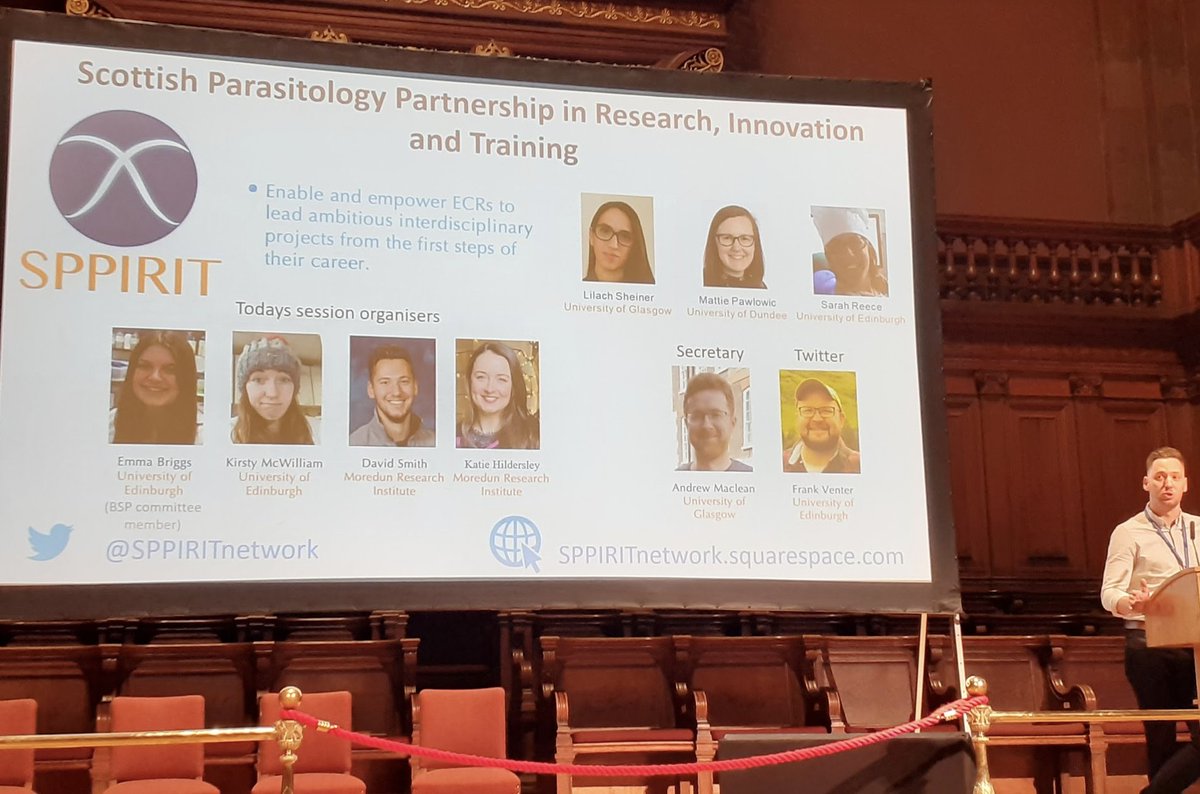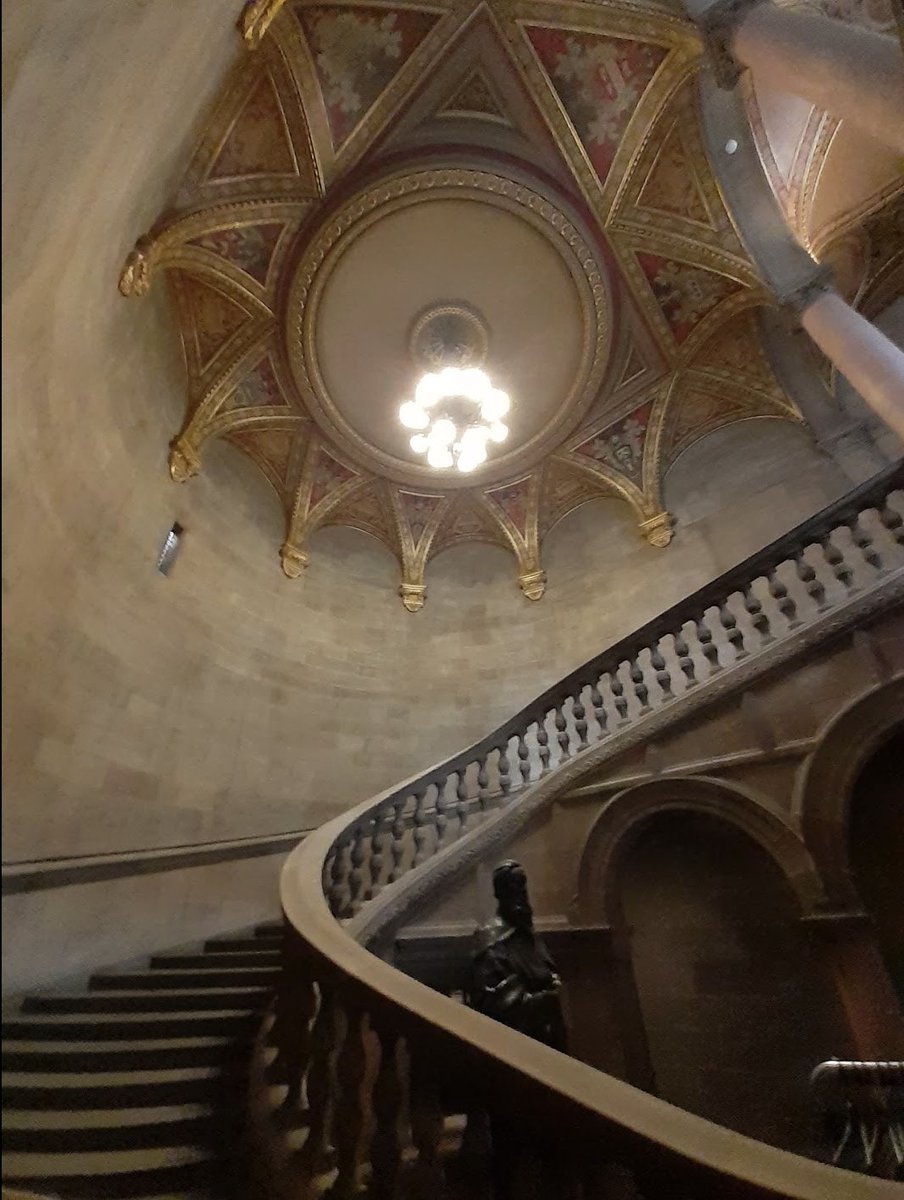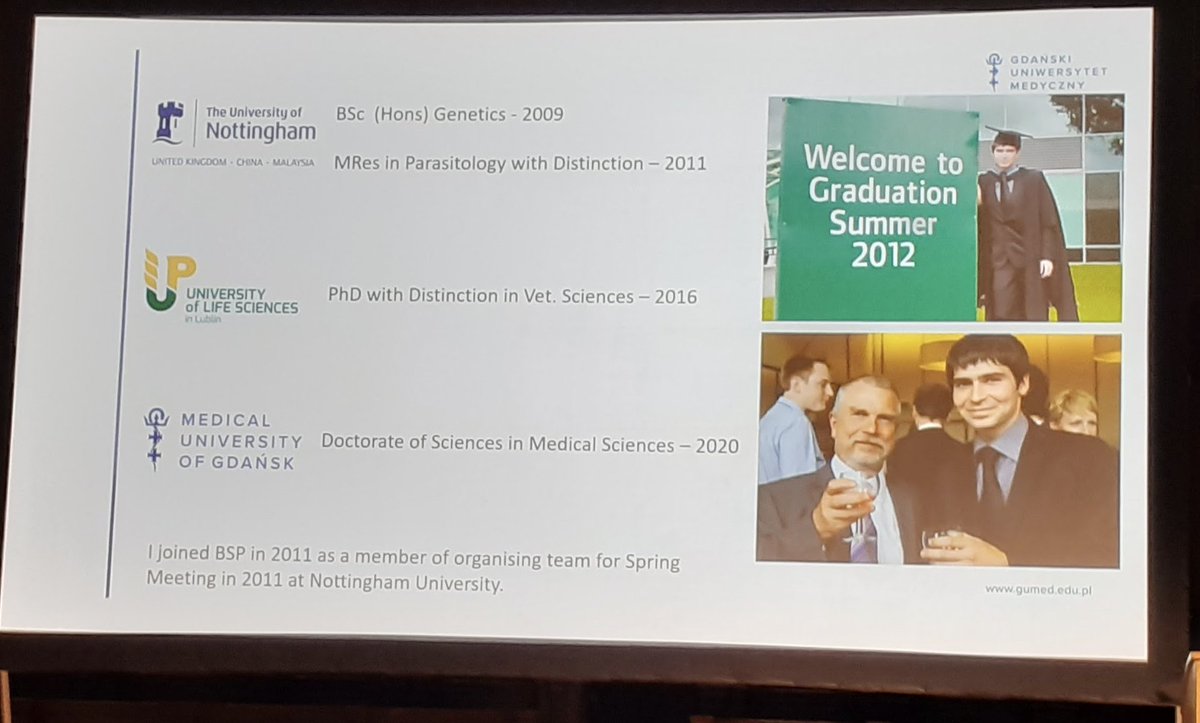Day 3 of #BSP2023 begins today with our @SPPIRITnetwork ECR session! SPPIRIT is an excellent ECR organisation for parasitologists working in Scotland, but all ECRs will benefit from the expertise today in publishing & attracting funding! #parasitology 

Here are the talks for today's @SPPIRITnetwork ECR session at #BSP2023! A big thanks to @CambridgeUP who are here in person as sponsors (so visit their table!). They are publishers of the journal "Parasitology" & an original sponsor of the BSP! cambridge.org/core/journals/… 

Our 1st talk at the #BSP2023 ECR session with @SPPIRITnetwork is from @StothardRuss, Parasitology Editor-In-Chief with tips on getting your manuscript 'in press'! There is also a webinar available with tips from @CambridgeUP at #parasitology 

Alison Paskins of @JnlParasitology and @JHelminthology gives the #BSP2023 ECR session information on #openaccess, creative commons licensing, #altmetrics (get blogging & tweeting about your research/publications!), discretionary fee waivers, & Parasitology's ECR award! 

And now from the #BSP2023 ECRs themselves! John Archer (@LSTMnews PhD student) & Dr Amy Ibrahim (@LSHTM/@LSHTM_malaria Research Fellow) tell the @SPPIRITnetwork session attendees about their own experiences with academic publishing. A big take-away: it takes TIME! #Parasitology 



Now to the #BSP2023 ECR session talks about funding/writing grants with Dr Ally Hughes, who is the Scottish Universities Life Sciences Alliance (@SULSAtweets) Project Manager (sulsa.ac.uk). Good point: remember that grant reviewers may not be experts in your area! 

Now @AnnamariaC of Inter-Change Research (inter-changeresearch.com), who will also speak at our Equality & Diversity session later today, discusses "Integration, collaboration, inter-disciplinarity" in science, e.g., do you want to collaborate to develop new technology? #BSP2023 

And now Charis Wilson of @EdinburghUni Central Research Office gives some excellent advice on ECR opportunities at our @SPPIRITnetwork #BSP2023 ECR session! Your institutes/universities will almost always have staff that assist with grant applications (incl. costings/budgeting)! 

And now for our 3rd Plenary session at #BSP2023 which will be given by Prof De'Broski Herbert (@DHerbertLab) of @Penn with "Hookworms dynamically respond to Type 2 immune pressure". #hookworm/#parasitology 

Prof Herbert is discussing some new #hookworm research (so keep an eye on @DHerbertLab for more to come!) investigating both gastrointestinal immunity/host adaptation to N. brasiliensis & cutaneous host immunity to STH invasion. Fantastic review at annualreviews.org/doi/10.1146/an…
Prof Herbert shows novel data which maps immune cell populations during primary and secondary cutaneous infections of mice with a soil transmitted #helminth. This research was led by PhD student Juan Inclan-Rico, so look out for his upcoming publications! drherbertlab.org
Our 4th Plenary session at #BSP2023 now moves to #parasite ecology with Prof Vanessa Ezenwa of @Yale with her talk on "Anthelmintic treatment dampens immunosenescence in a wild mammal with consequences for survival." #parasitology/#ecology 

Prof Ezenwa introduces us to "immunosenescence", aka "inflammaging", i.e. immunological changes occuring as a result of aging, & discusses the potential effect of inflammaging in responses to infections e.g COVID-19 (frontiersin.org/articles/10.33…) or parasites (elifesciences.org/articles/65180)
Prof Ezenwa now discusses her work in examining immune traits over time in African buffalo infected with gastrointestinal #helminths. Does senescence correlate among immune traits (eosinophils, platelets, monocytes, etc.)? A recent study using this model: besjournals.onlinelibrary.wiley.com/doi/full/10.11…
Prof Ezenwa investigates covariance between immune traits & their combined or independent effects on survival of the host after #helminth infection with or without anthelmintic treatment. Do helminths affect immunosenescence in chronic infection? Look out for the publication!
The #BSP2023 Public Engagement session with @WCIPGLASGOW & @ReeceLab is up the winding staircase & through the door! Hannah Bialic & Petra Schneider are teaching us all about science writing, science festivals, teacher training, @pintofscience, @STEMAmbassadors, evaluation,& more 





The @WCIPGLASGOW has a great list of resources at gla.ac.uk/research/az/wc…. If you would like the #parasite comics or would like WCIP people at your science event/festival, you can contact Hannah at Hannah.Bialic@glasgow.ac.uk
#BSP2023/#publicengagement/#scicomm/#parasitology
#BSP2023/#publicengagement/#scicomm/#parasitology
And for the @ReeceLab resources on Public Engagement, you can find the modules & feedback at thereecelab.com/public-engagem… & @pschneiderEDIN mentioned that there is support for people doing outreach & want to EVALUATE the impact at evaluationsupportscotland.org.uk
#scicomm/#BSP2023/#parasites
#scicomm/#BSP2023/#parasites
And now we have our #BSP2023 Equality & Diversity session. Our 1st talk is from Jo O'Leary, Head of EDI at @UKRI_News, a UK funder that invests >£8 billion each year, with "Equality, Diversity and Inclusion at UKRI: research and innovation by everyone, for everyone." 

Just last month, @UKRI_News published it's first Equality, Diversity, & Inclusion (EDI) strategy which can be read in full at: ukri.org/publications/u…
The 2022-'25 action plans for the separate councils (such as @BBSRC) can be found at bit.ly/3MH5FKm
#BSP2023
The 2022-'25 action plans for the separate councils (such as @BBSRC) can be found at bit.ly/3MH5FKm
#BSP2023
The @UKRI_News EDI strategy is evidence-based & there are avenues to prevent any harm, harassment, or bullying & report it (ukri.org/what-we-offer/…). @JoOLeary now tells us that still, 57% of PI awards are to white males! Women recieved 28% of PI awards only! #BSP2023
For @UKRI_News awards in funding; all of the data and stats for EDI are available at ukri.org/publications/d…, but here is just one striking chart for the '20-21 year! #BSP2023 

And our 2nd talk is from Prof Karen Halliday of @EdinburghUni who is telling us about "Systematic Inclusion", and showing us what she hopes is "provocative" data- the "leaky pipeline" in academia relating to women, black, & ethnic minority scientists. #BSP2023 

Just 2 of the slides from Prof Halliday in our #BSP2023 Equality & Diversity session. These data relate to @EdinburghUni but is a reflection of all UK institutions currently: the loss of female students from undergrad to postgrad level, & BME (black/minority ethnic) students. 



We now have our 3rd #BSP2023 Equality & Diversity talk before a panel session with the speakers: Annamaria Carusi (@AnnamariaC) of Inter-Change Research, doing research with @wellcometrust on "Race and Gender in Science." 

Dr Carusi starts with an historical perspective: the "father of modern taxonomy", Carl Linnaeus; did you know that he also classified humans? (linnean.org/learning/who-w…). Dr Carusi suggests a number of reads, including Stephen J Gould's "Mismeasure of Man" & tandfonline.com/doi/full/10.10…
Before our panel, we have already had a number of questions & comments, one addressing the data which has so far been divided into "women and men" categories & needs to be expanded to include non-binary people. Another issue is non-disclosure when it comes to disabilty. #BSP2023
There is never enough time to discuss the issues raised during our #BSP2023 Equality & Diversity sessions but if you would like to run a session; our speakers today have been:
@JoOLeary of @UKRI_News
@AnnamariaC of Inter-Change Research
@RunsOnAir of @EdinburghUni
@JoOLeary of @UKRI_News
@AnnamariaC of Inter-Change Research
@RunsOnAir of @EdinburghUni
Now for our #BSP2023 President's Medal winner: Dr Maciej Grzybek (@GrzybekMaciej) of the Medical University of Gdańsk, with his talk on "Biomonitoring and long-term studies on sylvatic rodents in Poland – the good, the bad and the effort." #parasitology 

Dr Grzybek joined the BSP himself in 2011 as an MRes student, and since that time has completed a PhD in Vet. Sciences ('16) & a Doctorate of Science in Medical Sciences ('20) alongside his 40+ publications! Incredible achievements in #parasitology as an ECR! #BSP2023 

Dr Grzybek (@GrzybekMaciej) describes his work to us in zoonotic parasites & viruses of European rodents, including 3 vole species & 3 mouse species, even examining whether European rodents could spread COVID-19 (they are not spreaders!): biorxiv.org/content/10.110… #BSP2023
Incredible wealth of data shown by Dr Grzybek stemming from his PolVole study & others, with data on #parasites such as mesocestoides (parasitesandvectors.biomedcentral.com/articles/10.11…), toxoplasma (preprints.org/manuscript/202…), toxocara (nature.com/articles/s4159…), trichinella (sciencedirect.com/science/articl…) & more!
Now for our #BSP2023 C.A Wright Memorial Medal talk, awarded to Dr Susan Wyllie of @dundeeuni/@DDU_Dundee with "Supporting NTD drug discovery through comprehensive mechanism of action studies and Tales from the world’s longest postdoc!". #parasitology 

Dr Susan Wyllie's (@LabWyllie) research at @DDU_Dundee/@WCAIRDundee has led to identification of drug targets for a number of parasitic diseases, including 4 clinical candidates, in addition to identifying the mode of action (MoA) of 40 compound series! modeofactiondundee.org/research/ 

Dr Wyllie describes the methods used in her lab (@LabWyllie) to identify the mode of action of compounds, including taking advantage of RNAi screens in #trypanosomes (great review at cell.com/trends/parasit…) & the chemical pulldown workflow used (antimalarial method shown). 

Great descriptions of methodologies at the @LabWyllie website: modeofactiondundee.org/research/ & some great published descriptions such as:
- Identifying antimalarial targets: sciencedirect.com/science/articl… + researchonline.lshtm.ac.uk/id/eprint/4668…
- Anti-leishmanial candidate: pnas.org/doi/10.1073/pn…
- Identifying antimalarial targets: sciencedirect.com/science/articl… + researchonline.lshtm.ac.uk/id/eprint/4668…
- Anti-leishmanial candidate: pnas.org/doi/10.1073/pn…
And work continues now into identifying anti-cryptosporidial drugs at @DDU_Dundee in collaboration with Dr Mattie Pawlowic (@goldenpipette), alongside continued work into targeting kinetoplastids, with a promising drug just described in 2021 at sciencedirect.com/science/articl…! #BSP2023
And now for a quick #BSP2023 AGM before Poster session B! #parasitology
With special thanks to our outgoing President, Prof Colin Sutherland of @LSHTM_malaria & our outgoing secretary Dr Kevin Tyler (@KevinMTyler) of @uniofeastanglia!
With special thanks to our outgoing President, Prof Colin Sutherland of @LSHTM_malaria & our outgoing secretary Dr Kevin Tyler (@KevinMTyler) of @uniofeastanglia!

And 2 new BSP Honorary Members announced: Prof Mark Carrington of @Cambridge_Uni & Prof Michael Miles of @LSHTM! #BSP2023 

@threadreaderapp unroll
• • •
Missing some Tweet in this thread? You can try to
force a refresh

















